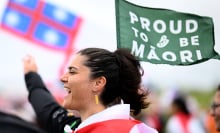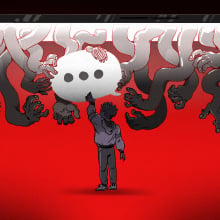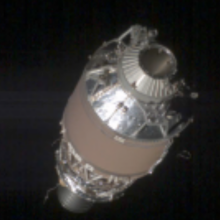Over the decades as Americans have reexamined the founding of the nation, the second Monday in October has come to be a source of great controversy.
Though many still celebrate Columbus Day — a holiday to remember the month in 1492 when Italian explorer Christopher Columbus was said to have "discovered" America — an increasing number of people have abandoned the tradition in favor of recognizing Indigenous People of the Americas.
Central to the Columbus Day conflict is the fact that, for many, the longstanding celebration did little to recognize the country's history of mass genocide and cruelty against the Indigenous People who lived in the Americas when Columbus arrived — a legacy that has continued long after. (Not to mention the fact that he never made it to North America at all — he landed in the Caribbean.)
The explorer's arrival heralded the start of American colonization and the end of an existing civilization, and those opposed to celebrating him are instead remembering the massacres of those Indigenous communities.
The United Nations declared Aug. 9 as the International Day of the World's Indigenous Peoples in 1994, and, rather than give Columbus any more credit, dozens of states and cities across the country have since chosen to celebrate Indigenous Peoples Day on Columbus Day.
President Joe Biden was the first U.S. president to commemorate the holiday, and has officially recognized Indigenous Peoples Day each year of his presidency.
States that have made changes
According to data from the Pew Research Center, "only 16 states and the territory of American Samoa still observe the second Monday in October as an official public holiday exclusively called Columbus Day." Other states have either changed the holiday's name, refer to it as both Columbus Day and another name, or don't recognize it as an official state holiday at all.
By 2017, four states had committed to celebrating Indigenous Peoples Day or Native American Day in place of Columbus Day: Minnesota, Vermont, Alaska, and South Dakota. In an official 2016 proclamation, Minnesota Gov. Mark Dayton highlighted the contributions Indigenous people had made to the state over the years through "traditional knowledge, experience, labor, technology, science, philosophy, industry, and arts." In 2017, Alaska Gov. Bill Walker called official Indigenous Peoples Day recognition "just one way we as a state can acknowledge and celebrate the contributions made by First Peoples throughout the history of this land."
As of this year, Vermont, Maine, South Dakota, Rhode Island, New Mexico, and Washington D.C. recognize the day as an official state holiday and use a title that centers Indigenous communities, either "Indigenous Peoples' Day," "Native American Day," or "American Indian Heritage Day." Seventeen states — including Washington, South Dakota, and Maine — as well as Washington, D.C., have holidays honoring Indigenous communities, although not all of them fall in October.
The state of Hawaii observes Discoverers' Day in place of Columbus Day. California doesn't have an official public holiday on the second Monday in October, but designates the day as Indigenous Peoples' Day by gubernatorial proclamation and celebrates the fourth Friday in September as Native American Day. In 2021, Texas declared the second week of October as Indigenous Peoples' Week. In Oklahoma, state law directs the governor to proclaim an official day for every tribe in the state, on a date of each tribe's choosing.
The majority of states, however, are phasing out the day completely: 26 states and the territory of Guam no longer recognize the October holiday at all, including those that were quick to make the nominal change years ago or which previously issued proclamations to honor a form of Indigenous Peoples' Day.
Tweet may have been deleted
Major cities committed to honoring Indigenous People
City governments have varying degrees of recognition, as well.
Berkeley, California, became the first U.S. city to replace Columbus Day back in 1992.
Major cities like Los Angeles, Seattle, Denver, Phoenix, Portland, and Austin followed suit years later, officially observing Indigenous Peoples' Day or Native American Day annually, though some still celebrate Columbus as well.
Seattle made the move to Indigenous Peoples' Day in 2014 after a unanimous vote from its city council. In 2017, Austin, Texas officially recognized the day, while the city of Los Angeles and Los Angeles County voted to completely replace Columbus Day with Indigenous Peoples' Day.
Columbus, Ohio, named for the explorer, no longer observes Columbus Day, and renamed it Indigenous Peoples' Day in 2020.
Most recently, Anchorage, Alaska and both Phoenix and Tempe, Arizona, officially designated Indigenous Peoples Day a holiday.
"This is about taking a stand against racism and discrimination," Seattle City Council member Kshama Sawant told the Seattle Times of its 2014 decision. "Learning about the history of Columbus and transforming this day into a celebration of Indigenous people and a celebration of social justice...allows us to make a connection between this painful history and the ongoing marginalization, discrimination and poverty that indigenous communities face to this day."
Other places taking a stand
Colleges and universities across the nation have embraced Indigenous Peoples Day as a time to honor Indigenous and Native American cultures and history by hosting events, inviting community engagement, and sharing educational resources throughout the month. DonorsChoose features classroom resources for educators seeking "ways to introduce Native American voices, narratives, and perspectives" to students, and institutions like the Smithsonian's National Museum of the American Indian offer programs and educational resources to expand knowledge of Indigenous history and cultures.
While government officials across the country have in the past considered making the change, others (including former President Donald Trump) have moved to reaffirm the celebration of Columbus.
On Oct. 3, the Indigenous Peoples' Day Act (which would officially replace Columbus Day as a federal holiday) was reintroduced in Congress with the support of 56 cosponsors in the House of Representatives.
"Indigenous Peoples' Day is an opportunity to commemorate Indigenous peoples' vibrant cultures and significant contributions to our nation — from before we became a union to today — and a day to acknowledge the persecution and discrimination that Native peoples have faced for centuries," wrote Kansas Rep. Sharice Davids.
UPDATE: Oct. 9, 2023, 11:25 a.m. EDT Originally published in October 2017, this story was been updated with additional reporting by Chase DiBenedetto in October 2023.
Topics Activism Social Good














